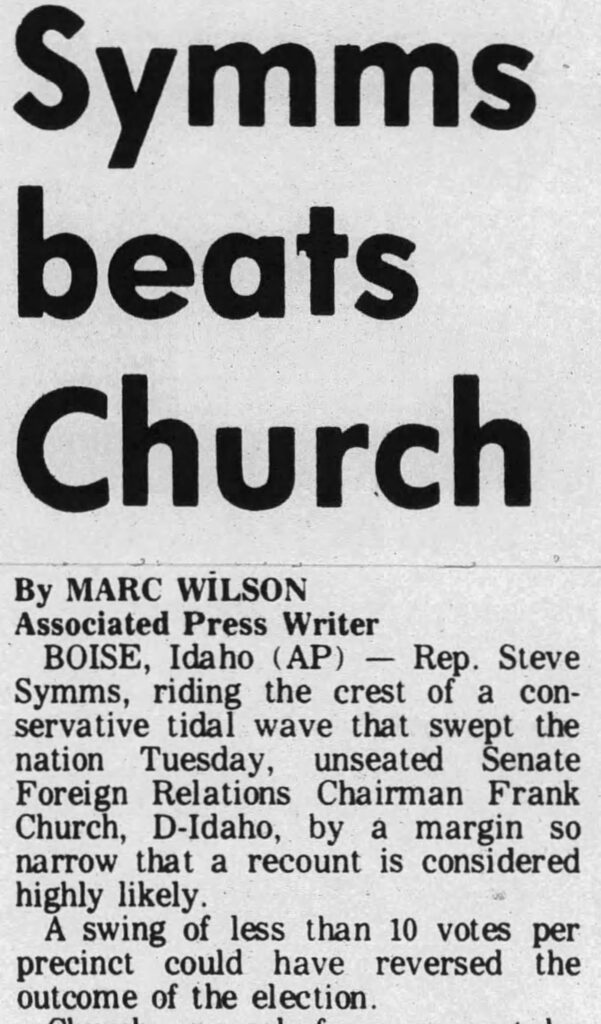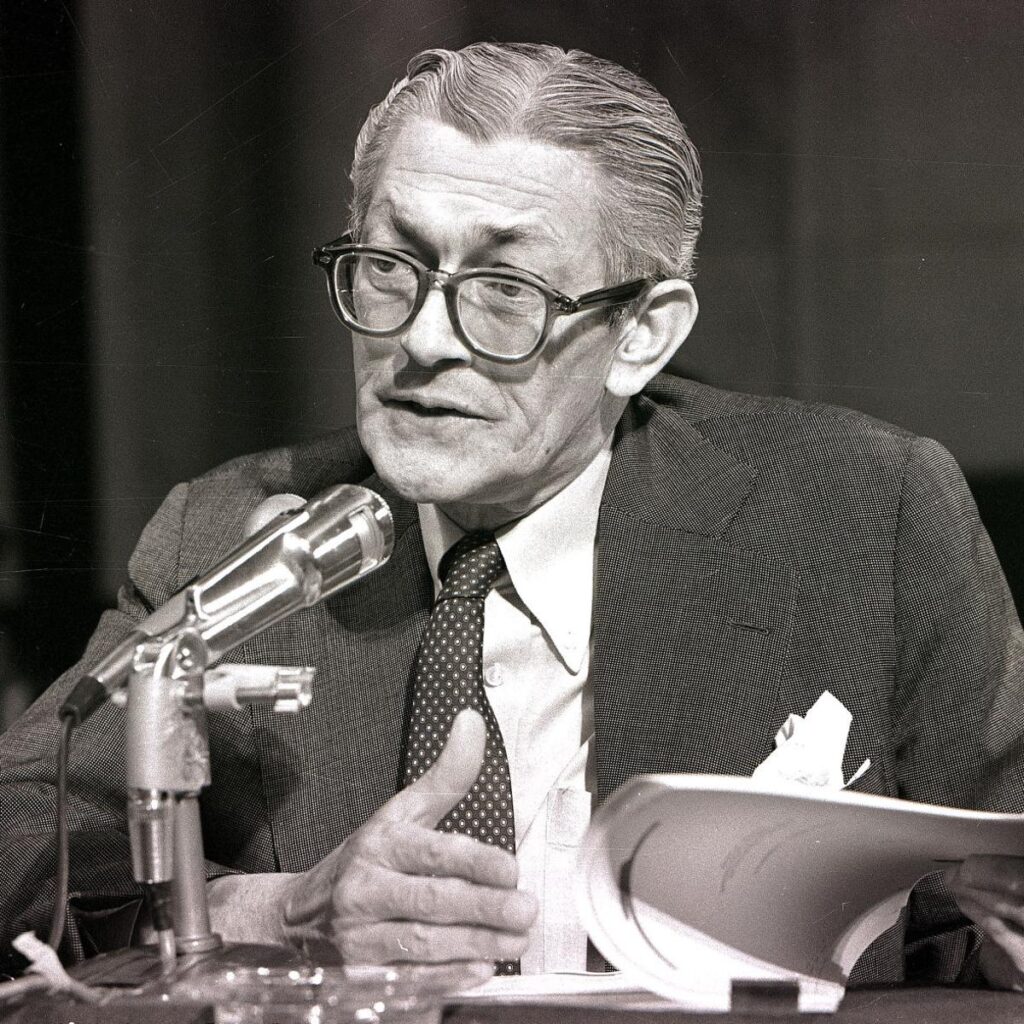On the Sunday before Idaho’s four term United States senator Frank Church lost re-election more than 40 years ago – the date was November 2, 1980 – it was clear that Church, the chairman of the Senate Foreign Relations Committee, early opponent of the Vietnam War, champion of the Wilderness Act and investigator of the vast abuses of the nation’s intelligence community might well lose to a glib darling of the New Right.
The Twin Falls Times-News reported on that long ago Sunday – the reporter on the story was a guy named Marty Trillhaase, now the editorial page editor of The Lewiston Tribune – that the campaign between Democrat Church and Republican Steve Symms amounted to “Idaho’s civil war,” not a fight between north and south but “left versus right.”

The hard right won that war and Frank Church lost in one of the closest Senate elections in Idaho history. Decades on its easy to see that the lies and distortions heaped on Church in 1980, much of it coming from a network of conservative ideologues determined to bend the Republican Party in new and destructive ways, was a preview of the politics we live with today.
To the extent Church is remembered in his native state today – he died of cancer in 1984 at the young age of 59 – it is for the majestic Idaho wilderness area that appropriately carries his name. Most who know the largest wilderness in the lower 48 states call it simply “the Frank.” It’s a fitting legacy for a man who understood that not every place, including the land along the spectacular Middle Fork of the Salmon River, need be cut and dug and despoiled. Church risked his political skin to convince his constituents of that truism.
Some may be old enough to remember that Church was among the very first to oppose the country’s ultimately disastrous escalation of a jungle war in southeast Asia. Before it became acceptable to decry the deadly sacrifice of more than 50,000 Americans, Church knew the rationale for making a Vietnamese fight an American fight was fatally flawed. He told Lyndon Johnson, the president of his own party, that the president was wrong. Cranks and Birch Society crackpots tried to recall Church in the 1960s. He was re-elected anyway in 1968 and ultimately helped force an end to that tragic war. This, too, is a fitting legacy.
Back in the days when politicians answered their mail, met their constituents, and sat for interviews, Frank Church had a brilliant staff of people around him who served him and the state with great professionalism and considerable pride. He inspired loyalty and insisted on competence. Not a great retail politician, that was wife Bethine’s great forte, Church became the chairman of the most prestigious committee in the Senate, but he could still find his way to the Burley Rotary Club. He knew how to press the flesh in Grangeville and campaign in Greencreek.

Church was fundamentally a bookish, shy, brainy man, not the normal pedigree of a modern politician. He read widely and wrote eloquently. He had a sense of humor and a sense of history. In an age when such attributes count for much less than a snarky Tweet, being welll-informed, intelligent and curious is a fitting Church legacy, as well.
Without question Frank Church was – and remains – the most accomplished federal legislator Idaho has ever produced, head and big shoulders above any of the inconsequential seat warmers there today. No one else comes close to Church’s legislative record, yet the state that elected him four times over three decades has taken such a precipitous turn to the hard right that the monuments and memorials to his accomplishments are few and far between. The far right, beginning in the 1960s and continuing through the coordinated national attacks on him in 1980, systematically denigrated Frank Church to such a degree as to tarnish the image of a man who deserves much better.
Church’s important legacy and place in Idaho and American history has, thankfully, been resurrected by an important new book that places Idaho’s greatest senator at the center of the history of his own times – and ours.
Prize-winning reporter and historian James Risen arrives at this particularly fraught moment in American history with The Last Honest Man, a compelling and persuasive assessment of Church’s career that ends up focusing on what Risen argues is Church’s great legacy – his massive, and massively consequential investigation of the American intelligence community.

ironically was also from Boise, Idaho
Many have now forgotten the substance of Church’s investigation, or perversely embrace the partisan mythology – thanks to Dick Cheney, among others – around the “Church Committee.” The reality is both relatively simple and still profoundly shocking.
The CIA engineered assassination attempts against foreign leaders, even enlisting the Mafia to try and kill Fidel Castro. Every president from Eisenhower to Nixon was culpable in these clearly un-American and illegal activities. We know this because of Frank Church.
The National Security Agency opened the mail of thousands of Americans and wiretapped countless others. We know this because of Frank Church.
The FBI spied on anti-war activists, wiretapped Dr. Martin Luther King, Jr. and tried to blackmail him. We know this because of Frank Church.
Richard Nixon and Henry Kissinger plotted to overthrow the sovereign foreign government of Chile, and to this day both have blood on their hands for the deaths of Chile’s president, Salvador Allende, in a military coup d’état, as well as murders of the head of Chile’s armed forces and a senior Chilean diplomat who was brazenly assassinated on the streets of Washington, DC. We know this because of Frank Church.
Church’s diligent and profoundly important work to make actions taken in our names by the American intelligence community resulted in major reforms and a continuing commitment to congressional oversight that simply did not exist before Church’s investigation.
Church, like all great men, had his flaws. At times he came off as haughty or too sure of himself.
Risen repeatedly accuses him of being overly “ambitious,” an accurate but hardly surprising trait for a politician elected to the Senate at age 32, and then re-elected three times as a liberal Democrat in a very conservative state. Church hungered for the presidency and considering most who have made it to that spot in recent times it’s easy to believe he was more than qualified and likely would have been successful.
Risen owes much to an outstanding earlier Church biography – Fighting the Odds – by Washington State University historian LeRoy Ashby and long-time Idaho journalist Rod Gramer, but he also substantially adds to the historical record with many interviews and new evidence of Church’s significance. Taken together the books reveal an incredibly important and accomplished American central to the history of the 20th Century.
As legal scholar Russell A. Miller noted of Church’s work in his study of the American intelligence community: “Of greater consequence than the resulting intelligence oversight and reform, the Church Committee stands as a historic monument to faith in constitutional governance. As a congressional body investigating the most secret realm on the presidential empire, the Church Committee represented a stubborn commitment to the Founding Fathers’ vision of limited government as secured by checks and balances, even in the face of America’s most vexing national trials.”
And that is the real legacy of Frank Church.
—–0—–
Additional Reading:
A couple of other weekend reads you may find of interest …
Lost story by ‘poet of the tabloid murder’ James M Cain discovered in Library of Congress
A story every researcher dreams of.
“A New York editor and literary detective is celebrating the discovery and release of an unpublished short story by James M Cain, one of the greats of American noir, a “poet of the tabloid murder” whose works made famous on film include The Postman Always Rings Twice, Double Indemnity and Mildred Pierce.”
Read the entire story in The Guardian.
Four Messages in the Big Sentence for Oath Keeper Stewart Rhodes

It turns out conspiring to overturn an election can get you in some very serious trouble.
Dennis Aftergut, a former federal prosecutor, write in The Bulwark.
“District Court Judge Amit Mehta sentenced Elmer Stewart Rhodes III, the Yale-educated leader of the militant Oath Keepers, to 18 years in prison for the rarely indicted crime of seditious conspiracy. Rhodes’s top lieutenant, Kelly Meggs, got 12 years behind bars.”
Read the full piece and wonder what the Man from Mar a Lago is thinking these days.
Jim Jordan, John Durham, and Their Ridiculous Investigations
After reflecting on the work of the Church Committee all those years ago the farce investigations playing out in the U.S. House of Representatives look even more ridiculous.
And these jokers said they were going to conduct a “modern day Church Committee” investigation. Right …
“Jordan’s bumptious, raucous, slapdash hearings are a far cry from the classic Senate hearings of 1975 conducted by the select committee chaired by Frank Church, an Idaho Democrat. The panel plumbed covert operations by the intelligence community, including the shockers that the US Army was spying on Americans and the CIA had tried to assassinate foreign officials, including Cuba’s Fidel Castro. The FBI infiltrated ‘subversive’ organizations, from civil rights to environmental to antiwar, to discredit them. When not planning assassinations, the CIA recruited journalists to sprinkle their stories with propaganda. The NSA targeted committee members and, with the help of telecommunication companies, tapped their phones.”
Here’s Margaret Carlson in The Washington Monthly.
Have a good Memorial Day weekend … and remember why we celebrate this holiday. All the best.






